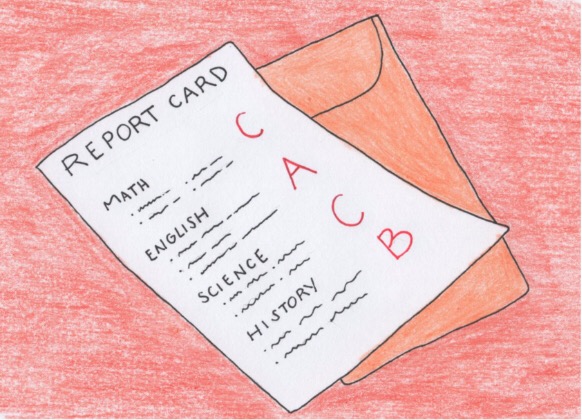
By Karen Phan, Staff Writer
Sometimes you get shortchanged. Sometimes you get scammed. Sometimes you get deceived. And when grades meet education, it’s easy to feel as if you’re cheated of genuine, meaningful learning.
Exams, homework, participation, projects are all condensed into one grade, but no one (ahem, parents and college admissions) bothers to look past the final score. Grades are an ambiguous indicator of academic performance and mastery. Everyone knows this, but the deeply entrenched emphasis on grades continues to burden students.
Traditional grades also assume that all classrooms fit into a cookie cutter, therefore A-F and qualitative grading will always be fair and practical, but that’s far from true.
Tests are 50 percent of my math grade. Good test takers can get away without doing homework, while bad test takers suffer. Every classroom is different, every teacher is different, and every student is different. As the saying goes, “if you judge a fish by its ability to climb a tree, then it will live its whole life feeling stupid.”
According to THNK, a Dutch leadership and innovation consultancy, “obtaining a grade signals the end of a learning process.” I read Anthem, The Old Man and the Sea and The Pearl for freshman English Honors. Those novels offered rich experiences, but I occasionally feel sour when I think of them because I got a C on the summer reading exam. Since then, the books have collected dust because I have no reason to bother with them. When grades are the end goal for what we do, the continuous, cumulative and exciting process of learning is undermined.
What grades truly enforce is academic gamesmanship, claims Cal State Dominguez Hills Professor Terry McGlynn. Depending on the course, the road to an A may include good work ethic, solid test taking skills and more. The [boring] students (myself included) who willingly comply to the system are the ones who ‘succeed’. Let’s not forget that many students avoid challenging themselves fear of jeopardizing their straight A’s, or selectively enroll in classes for a mere grade point average boost.
Furthermore, the added stress from grades inevitably leads to cheating. The anxiety of unfinished homework easily spurs cheating, as does the sheer terror of failing an exam. Cheating is a major villain in education, but people seldom address grades as its primary cause.
The list of problems goes on and on, but no widespread education reform has been enacted against traditional grades. Educators always say that nothing is impossible, so now let’s hold them accountable to that.
Education fails to foster curiosity and enrich students when grades are in the picture, and instead cheats students of valuable learning experiences. Academic, author and lecturer Alfie Kohn notes that graduates of grades-free high schools “are often more motivated and proficient learners, thus better prepared for college.” Abolishing grades is going to be tough, but it’s possible and necessary.
“Teachers can mitigate considerable harm by replacing grades with authentic assessments… any feedback they may already offer becomes much more useful in the absence of letter or number ratings,” writes Kohn.
Along with replacing grades with feedback, teachers can include student self-evaluation and review portfolios at least two times each semester. Growth and mastery of expected learning outcomes become more evident when students are aware of their performance.
These alternatives to grading certainly won’t work for every classroom, but there’s plenty of room for tweaks. That’s the beauty of it. Traditional grades are too rigid and harmful — they must go.
We have to recognize that our current grading system is limiting, inaccurate and problematic. Today’s students are the future, and it’s clear that grades are a disservice to our education and learning.





